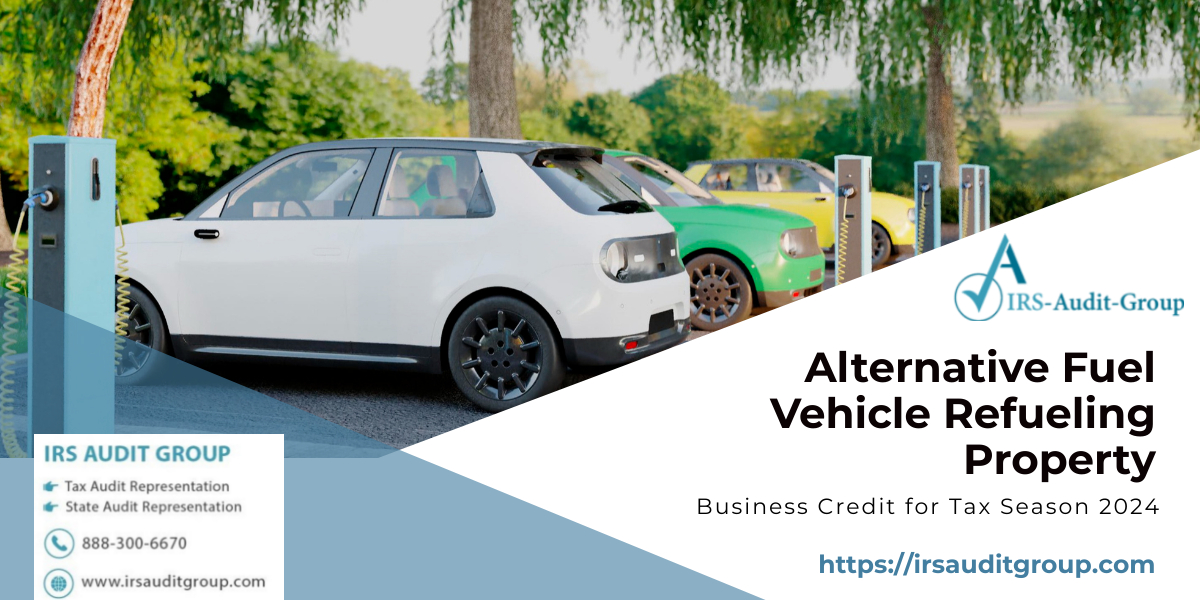What is the Credit?
Alternative Fuel Vehicle (AFV) Refueling Property credit is the credit given to taxpayers under section 30C credit. The taxpayers must have installed and utilized a certified vehicle refueling and recharging station at their residential or commercial properties in the tax year 2023 per the detailed eligibility criteria.
Eligibility Criteria
The criteria to qualify for the AFV Refueling Property credit is to have a property that must either store or dispense clean-burning fuel or recharge electric motor vehicles. Along with that:
- The property must be placed in service during the tax year 2023.
- The property should have an original use that began with the taxpayer.
- The property must be used primarily in the U.S. and U.S. territories.
- The installation must be either on business property or a main home.
To be eligible, all qualified fueling equipment also must be installed in a population census tract that is a low-income community or not an urban area.
How Much is the Credit for the Tax Season 2024?
The credit for qualified refueling property as of January 1, 2023, is as follows:
- 6% credit with a maximum credit of $100,000 for each single item of property, for properties that are subject to depreciation.
- 30% credit with $100,000 limit, for businesses that meet the prevailing wage and apprenticeship requirements.
- 30% of the cost with a maximum credit of $1,000 per item, for the qualifying properties that are not subject to depreciation.
- 30% of the cost of qualified property with a maximum total credit allowed of $30,000 per location for depreciable property and $1,000 per location for all the qualifying properties (including personal property) that is being placed in service before January 1, 2023.
What are the Key Changes in Tax Season 2024?
According to Notice 2024-20, the property placed in service as of Jan 1, 2022, to Dec 31, 2032, must follow the below qualifications, credits, and transfer options:
- Modification of Section 30C Credit Limitation:
- The IRS adjusted the limitation on the 30C credit, changing it from being based on the location of the property to being based on every single item of qualified AFV refueling property.
- For depreciable property, the credit is limited to $100,000 per item. For non-depreciable property, the limit is $1,000 per item.
- Requirement for Eligible Census Tract:
- The IRS introduced a requirement that qualified alternative fuel vehicle refueling property must be placed in service in an “eligible census tract”.
- Eligible census tracts are defined as low-income communities or areas that are not urban.
- To know if the property is eligible the taxpayers must determine the GEOID (an 11-digit ID) of the property and crosscheck with the GEOID in appendix A and B of the notice. If the property’s GEOID is listed in the notice, then the property is eligible for credit.
- To help determine if an installation location is in a qualified census tract, please see Argonne National Laboratory’s 30C Tax Credit Eligibility Locator tool and list of frequently asked questions.
- Clarification on Property Eligibility:
- The IRS clarified that the property will still be considered qualified AFV refueling property even if it can charge and discharge electricity from a vehicle battery to an external load.
- Modification of Qualified Property Definition:
- The definition of qualified AFV refueling property was amended to include depreciable property designed specifically to charge two- and three-wheeled electric vehicles primarily used on public streets, roads, or highways.
- Adjustment of Credit Amount:
- The IRS reduced the credit amount for depreciable qualified alternative fuel vehicle refueling property from 30% to 6%.
- An enhanced credit amount is provided for such property that is part of a qualified alternative fuel vehicle refueling project meeting certain criteria.
- Option for Applicable Entity Election:
- Applicable entities, defined in section 6417(d)(1)(A), can choose to make an election under section 6417 to treat the credit amount as a payment against the tax imposed by the Code.
- The amount of the section 30C credit, if treated as a general business credit under section 38, is considered an applicable credit.
- Transfer Option for Eligible Taxpayers:
- Eligible taxpayers can opt to transfer all or a portion of their section 30C credit determined for any taxable year to an unrelated taxpayer by making an election under section 6418.
How to Claim the Credit?
Partners and S corporations having AFV Refueling Property placed in service during the tax year 2023, can be reported and claimed by filling the Form 8911 (PDF), for more instructions visit https://www.irs.gov/pub/irs-pdf/i8911.pdf. Other taxpayers can report the credit directly online 1s of part III of Form 3800(PDF) which is general business credit, for more instructions visit https://www.irs.gov/instructions/i3800.
IRS Audit Group
IRS Audit Group consists of tax professionals, CPAs, enrolled agents, and tax attorneys. We are located in Los Angeles; California and our primary area of expertise is IRS Tax Audit Representation. However, our certified professionals cooperate and work with all IRS offices nationwide. Please contact us for more information. https://irsauditgroup.com/contact/
Telephone Number: (310) 498-7508
info@irs-audit-group.com

